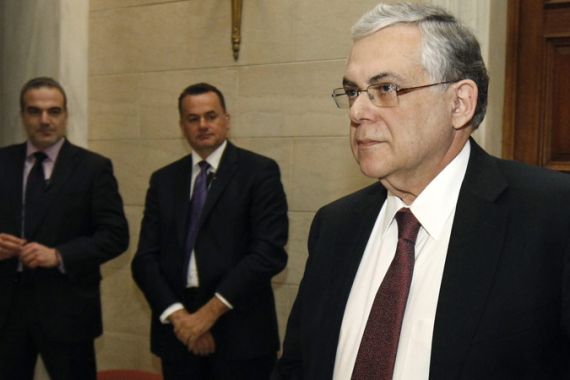Greek austerity talks stall on pension cuts
Finance minister heads to Brussels for talks, with Greek leaders still split over cuts package after “hard day’s night”.

 |
| Disagreement remains on the extent of the austerity measures among coalition partners [Reuters] |
Greece’s finance minister has gone to Brussels to meet eurozone counterparts, despite the country’s political leaders failing to agree on a package of austerity measures on which payment of the country’s latest bailout loan depends.
Evangelos Venizelos, who departed Athens early on Thursday after talks lasting into the early hours, said he remained optimistic that the Eurogroup meeting would reach a “positive decision” on a new aid plan for the debt-crippled nation.
Keep reading
list of 4 itemsWhy are nations racing to buy weapons?
Parallel economy: How Russia is defying the West’s boycott
US House approves aid package worth billions for Ukraine, Israel
But he also urged Greece’s coalition leaders to reach a last-ditch deal on which he said Greece’s “survival over the coming years” depended.
“It will determine whether the country remains in the eurozone or whether its place in Europe will be endangered,” Venizelos said. “There is no room for any other expediency: We must look Greeks in the eye, look at the national interest and the interest of our children.”
Lucas Papademos, Greece’s prime minister, held talks with coaltion party leaders into the early hours of Thursday, but the seven-and-a-half hour meeting broke up with the parties agreed on “all points of the plan except one”, according to the prime minister’s office.
A government source told the AFP news agency that the sticking point had been proposed pension cuts. Conservative and far-right leaders in the coalition reportedly considered the proposed 15 per cent cut to subsidiary pensions unacceptable.
“At 2 am, all I can say, is a line from the Beatles: ‘It is a hard day’s night,'” George Karatzaferis, the leader of the far-right LAOS party told reporters as he left for home.
Centrist newspapers took the country’s leadership to task in their Thursday editions, calling the crisis “political comeuppance,” Al Jazeera’s John Psaropoulous reported from Athens.
They accused the politicians of grandstanding and attempting to present themselves as defenders of welfare when cuts were necessary, our correspondent said.
Austerity measures to further reduce Greece’s crippling debt are demanded by the country’s so-called “troika” of bailout creditors – the European Union, the European Central Bank and the International Monetary Fund.
Papademos, the unelected prime minister who was appointed in November to steer Greece through its financial crisis, is seeking to push through financial reforms to secure $170bn in funds from the troika to avoid a March default on its bond repayments.
Unions call 48-hour strike
The Greek government has already accepted that it must cut 150,000 public-sector jobs by 2015 to get the new bailout, and reduce 2012 spending by a further 3.3bn euros ($4.3bn) as well as wage cuts in the private sector by 22 per cent and recapitalise banks.
But the measures are unpopular with many Greeks, with unions on Thursday calling for a two-day strike starting on Friday in protest over proposed cuts. The latest strike action follows a 24-hour walkout by many workers on Tuesday.
“They simply don’t care that they are causing such damage to the country and such damage to society,” said Stathis Anestis, a senior official at the GSEE union.

Greeks have already been hit with a spate of salary cuts and increased taxation over the past two years, amid record-high unemployment and a five-year recession.
The cutbacks have already seen unemployment rise to around 19 per cent and poverty to 20 per cent in Greece, according to data from the EU statistics agency Eurostat.
But disagreement remains on the extent of those cuts among coalition partners, who are set to face national elections in late April, after the debt deals have been sealed and implemented.
Greece is also in ongoing negotiations with private creditors over a separate agreement that would cut the country’s privately held debt load by 50 per cent, or some 100bn euros ($131bn).
The latest package of proposed austerity cuts requires approval at a cabinet meeting before parliament can vote on the measures.
Greece has been kept solvent since May 2010 by international rescue loans, amid fears that a Greek default on its debts could trigger an economic crisis throughout the eurozone that would shake the world financial system.